- HOME
- RESEARCH
- Research Clusters
- Plant Cell and Developmental Biology
RESEARCH
Plant Cell and Developmental Biology
Multicellular organisms require precise coordination of cell division and differentiation to ensure organized development. Plants have evolved a unique structure called the meristem, which consists of a pool of stem cells that divide and renew themselves continuously. The shoot apical meristem, which is formed during embryogenesis, plays a central role in generating postembryonic shoot organs such as leaves, stems and flowers. Focusing on key regulatory genes, we study how the shoot apical meristem is formed and maintained during the plant life cycle, and how the activities of these regulatory genes affect tissue morphology and behaviors.
On the other hand, plants sometimes produce gall-like structures induced by a number of other organisms, such as the root nodules induced by Rhizobium, and the galls induced by plant parasitic nematodes or insects. Parasites and symbiotes induce different types of plant responses, and sometimes they hijack the plant’s endogenous signaling pathways for their own purposes. For example, plant parasitic nematodes utilize root formation-related signaling pathways to induce cell division and form gall from pre-vascular cells to survive in plant roots. Furthermore, cell wall compositions are often modified in response to such developmental reprogramming during these biotic interactions.
In this Research Unit, Plant Cell and Developmental Biology, we characterize the molecular and physical mechanisms that contribute to plant development and plant–parasitic nematodes interactions using genetic, biochemical, physiological approaches. From a technical point of view, image analyses can be quite useful to mine valuable information from high-dimensional microscopic images. As such, we are also currently developing original image analysis tools tailored for experimental plant cell and developmental biologists.
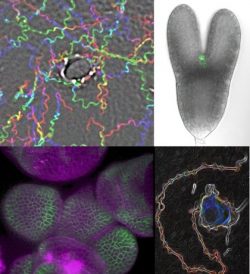
Cluster members
-
 CoordinatorShinichiro SAWA Website
CoordinatorShinichiro SAWA WebsiteProfessor
Faculty of Advanced Science and Technology, Kumamoto UniversityJapan -
 Carolina ESCOBAR Website
Carolina ESCOBAR WebsiteProfessor
Department of Environmental Sciences, School of Environmental Sciences and Biochemistry, University of Castilla La ManchaSpain -
 Bruno FAVERY Website
Bruno FAVERY WebsiteINRAE Senior Scientist
CNRS Institut Sophia Agrobiotech
*IROAST Visiting ProfessorFrance -
 Mitsuhiro AIDA Website
Mitsuhiro AIDA WebsiteProfessor
Faculty of Advanced Science and Technology (FAST), Kumamoto UniversityJapan -
 Takumi HIGAKI Website
Takumi HIGAKI WebsiteProfessor
Faculty of Advanced Science and Technology (FAST), Kumamoto UniversityJapan -
 Yuki YOSHIDA
Yuki YOSHIDAProject Assistant Professor
Faculty of Advanced Science and Technology, Kumamoto UniversityJapan -
 Hidehiko SUNOHARA
Hidehiko SUNOHARAEnvironmental Control Center Co.,Ltd.
*Visiting Assistant Professor, Kumamoto UniversityJapan -
 Reira SUZUKI
Reira SUZUKIVisiting Assistant Porfessor, Faculty of Advanced Science and Technology, Kumamoto University
Japan
Achievement
Publications
- in press
-
-
- Multiple layers of regulators emerge in the network controlling lateral root organogenesis
-
Trends in Plant Science.
-
- 2024
-
-
- TCA cycle impairment leads to PIN2 internalization and degradation via reduced MAB4 level and ARA6 components in Arabidopsis roots
-
Frontiers in Plant Science. 15. 1462235 (2024)
-
- CLE peptide signaling in plant-microbe interactions
-
Frontiers in Plant Sci. 15, 1481650 (2024)*Supported by "IROAST Publication Support Programs FY2024"
-
- VND genes redundantly regulate cell wall thickening during parasitic nematode infection
-
Plant Cell Physiol. 65(8). 1224-1230
-
- The overlooked manipulation of nucleolar functions by plant pathogen effectors
-
Front. Plant Sci., 15 (2024), 1445097
-
- 2023
-
-
- Root-knot nematode modulates plant CLE3-CLV1 signaling as a long-distance signal for successful infection
-
Science Advances, 9, 22, 2023*The results of this research were sent out to the media as a press release on May 31, 2023, and the press ban was lifted on June 3, 2023.
*Supported by "IROAST Publication Support Programs FY2023"
-
- CLE3 and its homologs share overlapping functions in the modulation of lateral root formation through CLV1 and BAM1 in Arabidopsis thaliana.
-
The Plant Journal, 113,6, 1176-1191
*The results of this research was sent out to the media as a press release on February 27, 2023.
*Added volume number on 24 March, 2023.
- 2022
-
-
- Rhamnogalacturonan-I as a nematode chemoattractant from Lotus corniculatus L. super-growing root culture
-
Frontiers in Plant Science, 13(2022):1008725
-
- Local Auxin Synthesis Mediated by YUCCA4 Induced during Root-knot Nematode Infection Positively Regulates Gall Growth and Nematode Development
-
Frontiers in Plant Science, 13(2022):1019427
-
Publications
Grants
Principal Investigator
- Kakenhi, Grant-in-Aid for Young Scientists (A)
- JSPS, Fostering Joint International Research (B)
Activities
May 2023:
Visit of Bruno Favery's laboratory in France
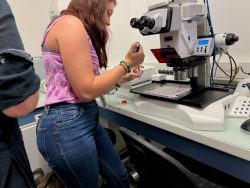
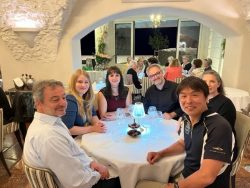
joint research joint research meeting
December 13, 2022:
International meeting in Kumamoto on “plant development and biotic interaction” (The 14th IROAST International symposium)
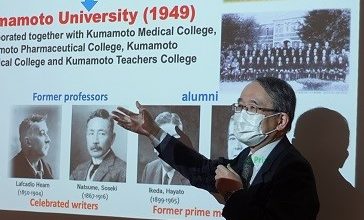
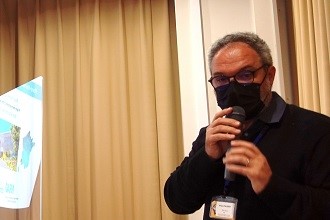
- Cluster of Young Researchers
-
- Ferroelectric Photovoltaics
- Next-Generation Design of Building Structures-DfX
- Low-Dimensional Molecular Electronics and Spintronics
- Development of extrachromosomal DNA control system for reprogramming drug-resistant cancer
- Development of Microbially-Aided Carbon Sequestration Technology
- Digital Plant Cell Biology
- Deep Learning for Hydrology
- Study of First-Generation Objects in the Universe with Radio Telescopes
- Separation, Synthesis, and Detection by Means of Ionic Solutes Handling
- Advanced Biomedical Evaluation System
- Environmentally Promising Processes for Medical and Skincare Nanomaterials
- Environmental Diagnosis on Earth Surface Systems
- Novel Cancer Medical Technology Using Liquid Biopsy
- Cluster of World-leading Researchers
-
- Development of Nano and Supramolecular Materials
- Plant Cell and Developmental Biology
- Nano-Organics and Nano-Hybrids
- Nano-medicine and Drug Delivery System
- Nano-medicine and Theranostics
- Structure and Dynamics of Materials Using Quantum Beams and Data-Driven Sciences
- Quantification of Three Dimensional Vascular Network
- Advanced Structural Materials
- Plant Stem Cells and Regeneration
- Microstructure Analysis and Grain Boundary Engineering
- Nano-materials for Energy Applications and Environmental Protection
- Micro- and Nanomechanics of Materials Science & Biological Systems




